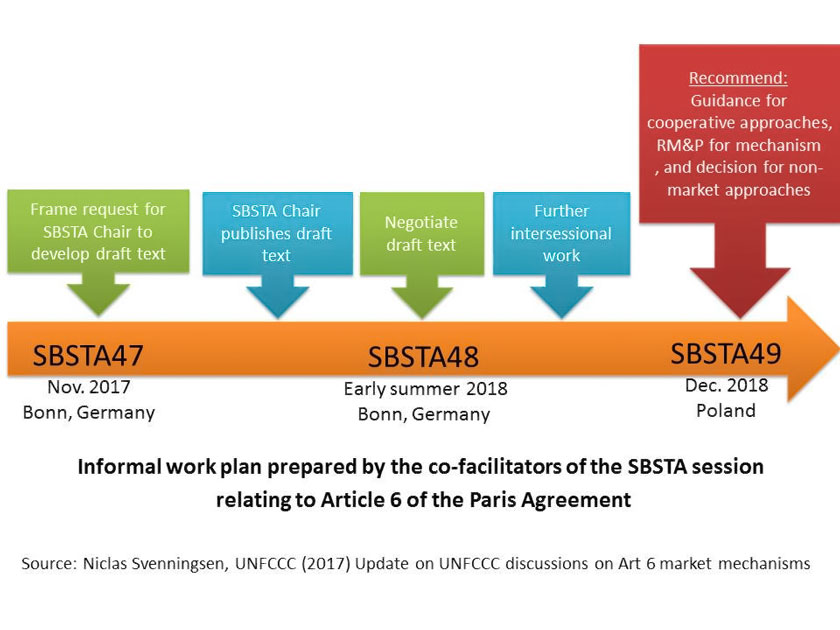Current Discussion in UNFCCC and other international framework
Article 6 of the Paris Agreement
What is the Paris Agreement?
196 countries/regions are members of the United Nations Framework Convention on Climate Change (UNFCCC) which stipulates the principles of climate change countermeasures and each year, they discuss detailed rules of implementation at the Conference of the Parties (COP). The Paris Agreement was adopted at the COP21 held in Paris, France in 2015, as a new international framework for the reduction of greenhouse gas (GHG) emissions beyond 2020.
The Paris Agreement stipulates that all Parties including major emitting countries shall submit and revise their GHG emissions reduction target every 5 years, report their implementation status through a common and flexible manner, and receive reviews as well. Moreover, international cooperation including the Joint Crediting Mechanism (JCM) has been included in Article 6 of the Agreement.
The Paris Agreement entered into force on 4 November 2016, when a threshold of 55 Parties to the Convention covering at least 55% of the total global greenhouse gas emissions ratified the agreement. In Japan, the Cabinet approved the conclusion of the Paris Agreement on 6 November 2016 and Japan deposited the acceptance letter of the “Paris Agreement” at the United Nations Headquarters to the Secretary- General of the United Nations. As of 21 September 2017, 162 Parties have ratified the Agreement.
Various approaches, including opportunities for using markets, have been discussed at UNFCCC negotiations since COP13 held in Bali, Indonesia. Efforts over 8 years of discussions have resulted in Article 6 of the Paris Agreement, which includes all the elements proposed by Parties, such as top-down/bottom-up approaches, and market mechanisms/non-market approaches. In order to be adopted by the Conference of the Parties serving as the meeting of the Parties to the Paris Agreement (CMA) within 2018, rules and guidelines are being drafted by the Subsidiary Body for Scientific and Technological Advice (SBSTA). SBSTA also gives advice to the COP, the Conference of the Parties serving as the meeting of the Parties to the Kyoto Protocol (CMP), and the CMA. The SBSTA meetings are usually organized twice a year (in May or June) in Bonn - Germany where the UNFCCC Secretariat is based, and also in November or December in conjunction with the COP/CMP/CMA.

Cooperative approaches
Are stipulated in Article 6.2 of the Paris Agreement, subject to the authorization of participating Parties, and it prescribes the use of emissions reduction/removals realized overseas to achieve national emissions reduction target. As one representative example of cooperative approaches, the JCM proposed and implemented by Japan, attracts great interest worldwide.
Issues such as double counting prevention are discussed at the SBSTA in order to prepare guidance for robust accounting. Japan contributes to the discussion by taking advantage of the experience of JCM implementation.
This clause is also applicable when linking emissions trading schemes (ETS) implemented by Parties.
The Mechanism
The establishment of a mechanism that contributes to the mitigation of GHG emissions and support sustainable development under the authority and guidance of the CMA, is stipulated in Article 6.4. Article 6.4 does not give a specific name to the Mechanism, in fact the Mechanism has several denominations among UNFCCC negotiators such as Sustainable Development Mechanism (SDM) or Sustainable Mitigation Mechanism (SMM).
Emissions reduction resulting from the Mechanism shall not be used to achieve emissions reduction targets of host countries if used by another Party to demonstrate achievement of its own targets. Having learned a lesson from the Kyoto Mechanisms, Article 6.4 Mechanism aims to achieve global emissions reduction by avoiding double counting.
SBSTA is currently developing rules, modalities and procedures for the Mechanism.
Non-market approaches
Are stipulated in Article 6.8 as a framework of mitigation, adaptation, finance, technology transfer, and capacity building to achieve sustainable development. Aiming at submitting the decision proposal to the CMA, SBSTA is in the process of formulating a work plan.

